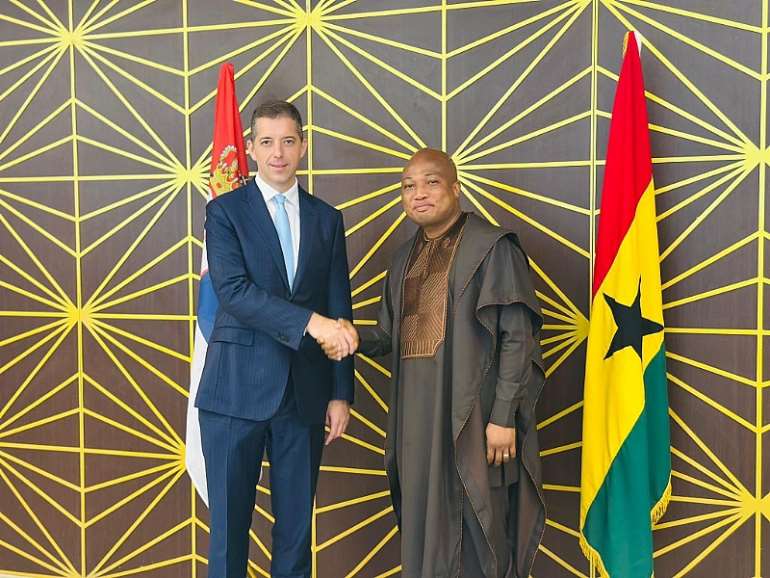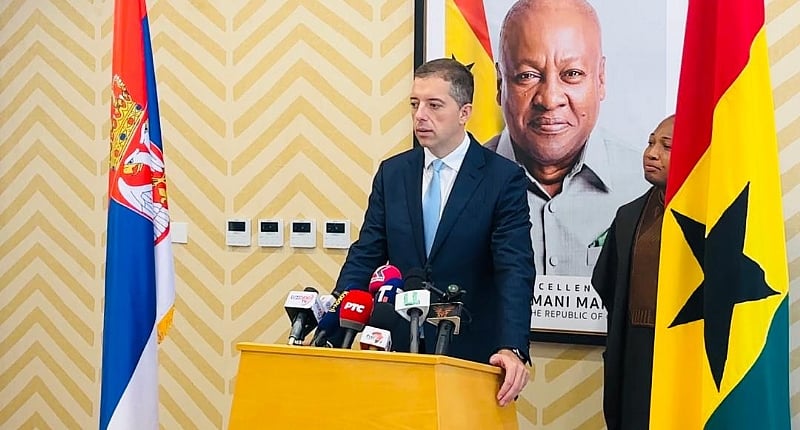The Serbian Minister of Foreign Affairs, Marko Đurić, has expressed strong admiration for Ghana’s proposed 24-hour economy initiative.
He described it as a visionary and transformative policy that could significantly accelerate the country’s economic growth and overall development.
Speaking at a joint press briefing with Ghana’s Minister of Foreign Affairs, Mr Samuel Okudzeto Ablakwa, in Accra, Mr Đurić said he was “inspired” by the concept and believed it presented new opportunities for economic partnerships between Ghana and Serbia.
He said both countries shared similar aspirations for transformation and resilience, and the 24-hour economy idea aligned with Serbia’s own experiences with bold reforms.
Mr Đurić said, “I must say I was inspired with what I heard about the ideas of having a 24-hour economy, to push the activities of the government, various agencies and economic drivers to a 24-hour mode, because I believe this can increase the pace of economic growth and development.”
“In fact, I believe that both Serbia and Ghana are countries of the future,” he added.
Mr Đurić highlighted his country’s remarkable economic turnaround as an example of what could be achieved through bold and disciplined reforms.
He said, “We’ve more than doubled our national GDP, cut unemployment from nearly 20 percent to under seven percent, and reduced our debt-to-GDP ratio from 79 percent to below 50 percent,” he noted.
The Foreign Minister emphasised that such outcomes were the result of deliberate and sometimes difficult decisions aimed at long-term stability and growth.
Ghana’s 24-hour economy initiative, a key policy proposal by the government of President John Dramani Mahama, seeks to run key sectors of the Ghanaian economy, including manufacturing, ICT, transport, services and energy, in continuous shifts to boost productivity, reduce youth unemployment, and transform the country into a regional economic hub.
Mr Đurić said the initiative presented a strategic opportunity for Serbian and other Eastern European businesses to engage with Ghanaian enterprises and expand trade between the two countries.
He described Ghana as a “key regional ally and partner”, deeply rooted in historic friendship but focused on modern, forward-looking cooperation.
The Serbian Foreign Minister confirmed that his government was ready to build economic bridges with Ghana with agriculture as a key entry point.

He said Serbia had strong biotechnology institutes and food production systems that could support Ghana’s food security and agricultural innovation agenda.
“Together with your agriculture minister, we will explore joint programmes that focus on food safety, agri-tech, and farmer support,” he stated.
The Serbian Minister also reaffirmed his country’s leadership in the field of artificial intelligence, noting that Serbia currently chairs the Global Partnership on AI, and urged collaboration to govern and shape the future of AI.
Mr Ablakwa welcomed the Serbian minister’s endorsement and commended Serbia’s own economic achievements as a useful example for Ghana to draw from.
He said Ghana’s push toward a 24-hour economy was grounded in the country’s demographic strength, digital ambition, and regional economic positioning as the host of the AfCFTA Secretariat.
“Ghana is not just dreaming of change, we are putting structures in place to modernise our economy and create opportunities for our people,” Mr Ablakwa stated.
“The 24-hour economy is part of a broader vision to promote innovation, expand access to jobs, and increase our global competitiveness,” he stated.
The two ministers agreed that while diplomatic ties between Ghana and Serbia had remained strong over decades, trade and economic cooperation had not matched that political goodwill.
They, therefore, committed to deepening trade partnerships in strategic areas such as agriculture, artificial intelligence, biotechnology, mining, maritime security and education.
Mr Ablakwa admitted, “We acknowledge that the trade volumes are not impressive, but there is great room for improvement, and with Serbia’s expertise in key sectors and Ghana’s strategic market access, we can turn things around.”
Lithium and clean energy development were also high on the agenda as both Ghana and Serbia have discovered lithium deposits.
The ministers discussed collaboration in exploration, processing, and value addition to support sustainable energy transitions and industrial growth.
The Serbian Foreign Minister is in Ghana on a four-day official visit, during which he will meet with the Speaker of Parliament, the Ministers for Food and Agriculture, Defence, Youth and Sports, and Tourism, Arts and Culture.
The visit is expected to result in new memoranda of understanding across several sectors, including labour mobility, education and defence.
GNA


